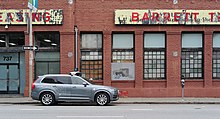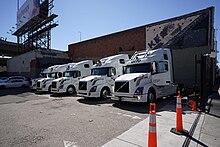 | |
| Company type | Subsidiary |
|---|---|
| Industry | Automotive, technology |
| Founded | January 2016 (2016-01) |
| Founders |
|
| Defunct | 2018 (2018) |
| Fate | Defunct |
| Headquarters | 737 Harrison, San Francisco, California, U.S. |
| Products | Self-driving kit for long-haul trucks |
| Parent | Uber |
| Website | ot |
Ottomotto LLC, d/b/a Otto, was an American self-driving technology company founded in January 2016 by Lior Ron and Anthony Levandowski.
The company was based in San Francisco and employed 90 people as of August 2016. The company focused on retrofitting semi trucks with radars, cameras and laser sensors to make them capable of driving themselves. In August 2016, Otto was acquired by Uber. Lior Ron, the co-founder of the company, had stated that Otto would have self-driving fleets of trucks on the road by early 2017, which, before the company ceased, never materialized.
History
Otto was established in January 2016, and was one of a new generation of automobile firms venturing into making self-driving vehicles. The company was founded by Anthony Levandowski, who worked on the Google self-driving car project, and Lior Ron, who was a product lead on the Google Maps team. Claire Delaunay, who led the software development and Don Burnette, from Google’s self-driving car team were also co-founders. The team in August 2016 comprised 90 employees, with engineers from Google, Apple Inc., Tesla, Logitech, Stanford University and elsewhere. The firm’s base was a garage in the South of Market neighborhood of San Francisco.
As of August 2016, Otto had converted five Volvo 780 semis with self-driving technology and was testing them on interstate highways.

In August 2016, Otto was acquired by Uber at an estimated valuation of $680 million. Otto was to stay independent from Uber, according to Lior Ron. Anthony Levandowski would continue heading up Otto, as well as being in charge of Uber's self-driving division.
In October 2016 an Otto truck achieved the longest continuous journey by a driverless and autonomous semi-truck. It was a 132-mile route from Colorado Springs to Fort Collins in Colorado, USA. The truck traveled autonomously without a lead vehicle, teleoperation, or any other human intervention.
In February 2017, Waymo, a subsidiary of Alphabet Inc., filed a lawsuit against Uber, alleging that Anthony Levandowski "downloaded 9.7 GB of Waymo’s highly confidential files and trade secrets, including blueprints, design files and testing documentation" before resigning to found Otto. In March 2017, United States District Judge William Alsup, referred the case to federal prosecutors after Levandowski exercised his Fifth Amendment right against self-incrimination. In May 2017, Judge Alsup ordered Levandowski to refrain from working on Otto's Lidar and required Uber to disclose its discussions on the technology.
Clearpath Robotics filed a complaint in the Northern District of California on August 24, 2016 against Ottomotto LLC with respect to its OTTO brand. The action was dismissed with prejudice on February 1, 2017. Clearpath Robotics continues to operate the OTTO brand. In response, Clearpath issued a statement about the confusion. In May 2017, Uber officially retired the Otto brand as a result of the lawsuit with Clearpath Robotics Inc.
In July 2018, Uber shuttered the Otto project and ceased development of self-driving trucks to focus on self-driving passenger vehicles.
Technology and goals

Otto did not build its own trucks. Instead, the company made hardware kits which could be installed on trucks at service centers or factories. They used similar technology to those developed by Google and Nissan, equipping the trucks with radar, cameras, and lidar.
The goal of the company over the first few years was stated to be for the technology to be used by truck drivers during long-haul drives to allow them to rest during the journey. This in turn would reduce the number of hours it took for drivers to complete a journey by potentially being able to drive continuously, and overcome the 11-hour legal restriction on manual driving. The automated technology was intended to make driving more efficient, and allow a truck driver to sleep while the truck is driving itself. In 2016, Levandowski stated: "Our goal is to make trucks drive as humanly as possible, but with the reliability of machines."
According to John Markoff of The New York Times, Otto made the conscious decision to automate trucks rather than passenger vehicles because, “Nationally, trucks drive 5.6 percent of all vehicle miles and are responsible for 9.5 percent of highway fatalities.” In an interview with Emily Chang of Bloomberg West, David Kirkpatrick, the CEO of Techonomy Media, stated that the public was far more likely to embrace trucks with automated driving than passenger vehicles due to the wide perception that trucks are driven dangerously by truckers. The need to make truck driving safer was one of the aims of the firm. Ron was quoted as saying: "We want to get the technology to the point where it's safe to let the driver rest and sleep in his cabin and we can drive for him, exit to exit."
Eventually the company hoped to develop trucks able to drive autonomously on the 220,000 miles of highways in the US, though in some states such as California there may have been regulatory obstacles. The firm intended to collect safety data to demonstrate the benefits of the automated technology.
See also
References
- ^ Griffith, Erin (19 August 2016). "Uber's $680 Million Gut-Punch to Google - The hard-charging startup just acquired the guy behind Google's self-driving car program". Fortune.com. Retrieved 19 August 2016.
- ^ Markoff, John (17 May 2016). "Want to Buy a Self-Driving Car? Big-Rig Trucks May Come First". ’’The New York Times’’. Retrieved 8 August 2016.
- Griffith, Erin (23 June 2016). "Who Will Build the Next Great Car Company?". ’’Fortune’’. Retrieved 8 August 2016.
- ^ Liedtke, Michael. "Startup wants to put self-driving big rigs on US highways". Associated Press. Archived from the original on 2 July 2016. Retrieved 8 August 2016.
- Kelly, Heather (17 May 2016). "Google self-driving car vets take on automated trucks". CNN. Retrieved 8 August 2016.
- Yadron, Danny (17 May 2016). "Could self-driving trucks hit America's highways? This startup thinks so". ’’The Guardian’’. Retrieved 8 August 2016.
- ^ "Startup Otto Aims to Leapfrog to First in Self-Driving Vehicles With Big Trucks". Forbes. 1 August 2016. Retrieved 8 August 2016.
- Harris, Mark (19 August 2016). "How a robot lover pioneered the driverless car, and why he's selling his latest to Uber". The Guardian. Retrieved 19 August 2016.
- "Longest continuous journey by a driverless and autonomous lorry". ’’Guinness World Records’’.
- Chafkin, Max; Bergen, Mark (16 March 2017). "Did Uber Steal the Driverless Future From Google?". Bloomberg Businessweek. Retrieved 19 May 2017.
- Isaac, Mike (18 May 2017). "How Uber and Waymo Ended Up Rivals in the Race for Driverless Cars". The New York Times. p. A1. Retrieved 19 May 2017.
- Wakabayashi, Daisuke; Isaac, Mike (31 March 2017). "Uber Executive Invokes Fifth Amendment, Seeking to Avoid Potential Charges". The New York Times. p. B5. Retrieved 19 May 2017.
- Isaac, Mike (16 May 2017). "Uber Engineer Barred From Work on Key Self-Driving Technology, Judge Says". The New York Times. p. B1. Retrieved 19 May 2017.
- "OTTO Motors Releases Statement on Waymo v. Ottomotto Lawsuit". 6 February 2022.
- "Uber Quietly Drops Otto Truck Unit Name Following Trademark Spat". Forbes.
- Korosec, Kirsten (30 July 2018). "Uber's self-driving trucks division is dead, long live Uber self-driving cars". TechCrunch. Retrieved 2 August 2018.
- Ziegler, Chris (17 May 2016). "Google veterans head off on their own to work on self-driving trucks". ’’The Verge’’. Retrieved 8 August 2016.
- Kharpal, Arjun (17 May 2016). "Otto, a start-up by ex-Googlers to make trucks driverless, has launched". CNBC. Retrieved 8 August 2016.
- ^ "Will Autonomous Trucks Kill Jobs?". Bloomberg. 18 May 2016. Retrieved 8 August 2016.
- Bajpai, Prableen (2 June 2016). "Self-Driving Trucks Could Revolutionize The Industry". Nasdaq. Retrieved 8 August 2016.
- "Otto offers retro-fit driverless lorries". BBC News. 17 May 2016. Retrieved 8 August 2016.
- "Creator of Google's first self-driving car launches truck startup (VIDEO)". ’’Silicon Valley Business Journal’’. 17 May 2016. Retrieved 8 August 2016.
External links
| Uber | ||
|---|---|---|
| Founders | ||
| Executives |
| |
| Subsidiaries | ||
| Acquisitions | ||
| Defunct/Former | ||
| History | ||
| Related | ||
- Uber acquisitions
- Self-driving car companies
- Vehicle safety technologies
- Advanced driver assistance systems
- 2016 mergers and acquisitions
- Technology companies based in the San Francisco Bay Area
- 2017 disestablishments in California
- American companies disestablished in 2017
- Defunct manufacturing companies based in the San Francisco Bay Area